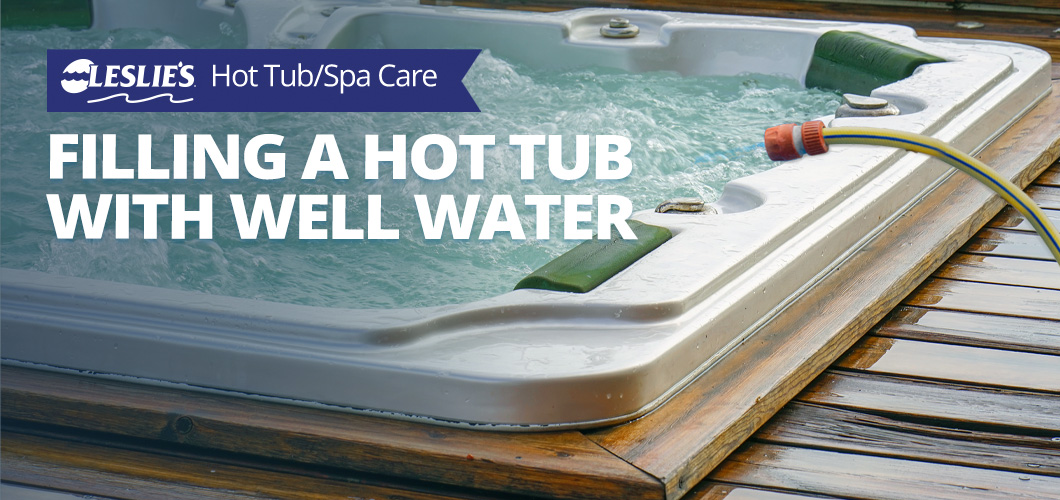
Filling a Hot Tub with Well Water
Is it OK to fill a hot tub with well water? The short answer is yes, you can. The short answer is incomplete, though, without addressing the concerns of using well water in a hot tub. On the good side, well water is naturally pure, filtered for decades underground, without chemical additives or byproducts of treatment. On the bad side, well water can contain high levels of minerals and metals, dirt and dust, which can stain spa surfaces, and make water balancing more difficult.
Will Filling a Hot Tub Burn Out the Well Pump?
In all likelihood, filling a hot tub with well water won't burn out the well pump, because you'll only need to run the hose for a few hours, and you've probably run a garden hose for several hours before, watering or pressure washing around the house. Most hot tubs use only 300-400 gallons to fill, and when you consider that some people fill a 20,000 gallon pool from a well, filling a hot tub from a well shouldn't be a problem.
Can Well Water Stain My Spa?
Metals and minerals contained in spa water can stain soft surfaces, and at high levels and under the right conditions can deposit onto slick spa surfaces. Minerals such as calcium or magnesium can mix with dirt and other particles to form scale deposits or rough calcium nodules, again under the right (poor) water chemistry conditions. Metals like iron and copper can also discolor the water, or stain some surfaces - shades of brown to red for iron, and from blue to green for copper.
To prevent staining and scaling in a spa or hot tub using well water, you want to both filter out as much as you can (see below) before filling, and secondly keep minerals and metals dissolved in solution, by using a sequestering agent to lock them in solution. Leisure Time Metal Gon and Defender are used to keep metals and minerals from precipitating out of solution, clouding the water or staining spa surfaces.
Is Well Water Hard to Balance in Spas?
Depending on the types of soils and rock in your area, well water may test low or high for pH, Alkalinity and Calcium Hardness. pH and Alkalinity are usually easily adjusted, except in cases where pH is low and Alkalinity is high. This can take several treatments of pH Decreaser (followed by pH Increaser), over several days, to bring into proper ranges.
And depending on how hard or soft your well water is, your Calcium Hardness level may be low (soft) or high (hard). Soft spa water (under 150 ppm) is easily corrected by adding Calcium Hardness Increaser, but hard spa water (over 400 ppm), has no chemical reducer available. Spa water softeners like Defender don't actually remove the excess calcium from the water; molecular bonds keep it chemically locked in solution, where it can't deposit as films or nodules.
Water clarity is an issue that affects some hot tubs filled with well water. Silty brown or green water can be avoided by using a pre-filter on the end of your garden hose, or using other methods to filter the water before it enters the hot tub, described below. Your spa filter will trap much of the suspended solids, but using it will shorten its lifespan by a small amount. Spa clarifiers can also be used to coagulate very small particles into larger, more easily filtered clumps.
Pre-Filtering Well Water While Filling a Hot Tub
Many homes with a well also have a home water softening system, which also filters the water. However, most outside water spigots are not connected to the water treatment system, because it is assumed that you are just washing the car or watering the lawn. With the use of a sink faucet hose adapter, you can connect a garden hose to the kitchen sink or utility sink for pre-filtered well water. You could also connect directly to the clothes washer hose, or to the water treatment system itself.
The second way to filter your well water before adding it to the hot tub is to use a pre-filter, which attaches to the end of your garden hose to remove particles smaller than 1 micron. It can remove metals, minerals, silty dirt and other things much too small to see, and is useful also for those with city water to remove treatment chemicals or chlorine byproducts.
A DIY bucket filter can also be used, by filling a 5-gal bucket (with a lid) completely full of Poly fill, or polyester filling used in pillows and comforters. Drill holes in one half of the bucket lid, and on the bottom of the bucket, use silicone and thread sealant to secure a female garden hose adapter. Poly fill can trap silty dirt in the 5-10 micron range, but not minerals and metals.